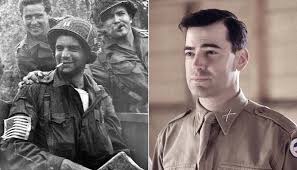Captain Lewis Nixon III is a remarkable figure in the history of the Allied invasion of Europe during World War II. As a member of the 101st Airborne Division, he played a critical role in historic clashes such as D-Day and the Battle of the Bulge, fighting alongside Major Dick Winters and the legendary Easy Company.
The Bond of Brothers
Lewis Nixon and Richard Winters, as portrayed in HBO’s Band of Brothers, formed a close bond despite their differences. Nixon, a seasoned Ivy Leaguer and world traveler, and Winters, a Pennsylvania native who had never left his state before joining the Army, became lifelong friends.
According to Winters, Nixon was the best combat officer he had the opportunity to work with under fire. Nixon displayed unwavering courage and a clear, quick-thinking mind, especially during the toughest times.
Lewis Nixon’s Early Life
Lewis Nixon, born on September 30, 1918, in New York City, led a privileged and adventurous life. Raised in a wealthy family, he had the opportunity to travel extensively across Europe and experience its diverse cultures before the rise of Hitler.
Highly intelligent, Nixon attended Yale University for two years before enlisting in the U.S. Army. Little did he know that his life was about to take a dramatic turn.
Easy Company’s “Band of Brothers” Prepare For War
After basic training, Nixon and Winters met at Army Officer Cadet School in Fort Benning, Georgia. Both became Second Lieutenants before parting ways temporarily.
Nixon joined the Military Police while Winters volunteered to join the paratroopers. They were eventually reunited in Easy Company, the 506th Parachute Infantry Regiment at Camp Toccoa, Georgia. Here, they met Herbert Sobel, Easy Company’s strict leader, whose demotion paved the way for Winters to become First Lieutenant and Nixon to command the 2nd Platoon.
In September 1943, the 506th Parachute Infantry Regiment deployed to Aldbourne, England, to prepare for the invasion of Normandy.
Lewis Nixon’s Heroics In Nazi-Occupied Europe
On June 6, 1944, the Allied Invasion of Normandy began. With Winters now in charge of Easy Company, they played a crucial role in clearing key landing sites for the arrival of Allied troops. The Brécourt Manor Assault, led by Winters, became a legendary battle strategy.
Nixon, on the other hand, found important intelligence detailing German defensive positions on the coast. He promptly delivered it to the chain of command, allowing the Allied forces to plan accordingly.
Their efforts continued throughout the war. Nixon’s bravery shone during the Battle of the Bulge, where he and Winters held their ground against 15 German divisions that had cornered the 101st Airborne for nearly a week.
As the war neared its end, Easy Company arrived at the Kaufering IV concentration camp in Bavaria. The unimaginable horrors they witnessed confirmed the vital importance of their mission.
The Postwar Life of Lewis Nixon
Although the war ended in 1945, Nixon’s personal battles persisted. Struggling with alcoholism, he experienced multiple divorces before finding love with Grace Umezawa, whom he married in 1956. Together, they embarked on a life of travel.
Despite the challenges, the bond between Nixon and Winters remained unbroken. Winters delivered Nixon’s eulogy when he passed away on January 11, 1995, at the age of 76.
The story of Captain Lewis Nixon III and the ‘Band of Brothers’ he served with is one of resilience, friendship, and selflessness in the face of adversity. Theirs is a legacy that will forever be remembered in the annals of history.
